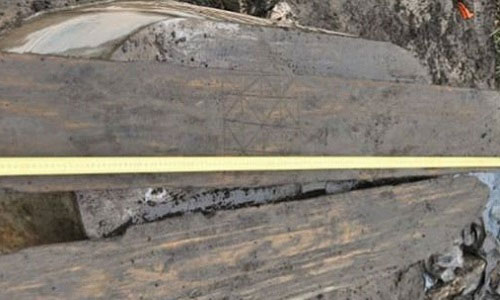Excavation of ancient tsarist chessboard
The 17th-century chessboard was engraved on the seat surface so that the players could easily hide it when the Tsar's soldiers came to check it out.

The alquerque chessboard is found in Pskov.(Photo: RT).
Archaeologists found an underground casino near a decommissioned thermal power plant in the Pskov region, 620km west of Moscow. The casino consists of wooden benches with an engraved chess board dating back over 300 years.
According to archaeologists, gambling in Russia was banned under Tsar Alexis I, so players must devise many ways to hide the activity if they do not want to face severe punishment. If an uninvited guest knocks on the door, the player will quickly place a carpet on the board and sit on it.
Last year, the team found large numbers of alquerque pieces and the new findings provide evidence of the diverse pastime of the Pskov residents of that time.The alquerque flag , also known as quirkat, is one of the oldest chess games in the world. It originated from Egypt, was brought into Spain by the Arabs in the 8th century. Researchers still do not know the exact rules of the alquerque.
- Ancient chessboard in a secret room in the 13th century castle
- New style of chess: two players play at the same time, each piece has its own "cooldown"
- Ancient chessboard in secret room in 13th century castle
- Find ancient texts about the
- China suspended excavation of the tomb of Qin Shi Huang
- The prize was awarded to the postman on the board, winning 1 million dollars in bonuses
- Discovered 60 4th century human skeletons in Italy
- Ancient people eat snails from 30,000 years ago
- Add traces of civilization to ancient inhabitants
- Excavation of the grave of ancient Egyptian priests
- Excavation of boats carrying antiques in Quang Ngai
- Archaeological excavations of ancient Hoi An port in Ha Tinh
- Excavation of shipwrecks for 500 years carrying
- Discovering ancient tombs
 Discovered an ancient centipede fossil 99 million years old
Discovered an ancient centipede fossil 99 million years old Discovered bat-like dinosaurs in China
Discovered bat-like dinosaurs in China Discovered a 200-year-old bronze cannon of the coast
Discovered a 200-year-old bronze cannon of the coast Discover 305 million-year-old spider fossils
Discover 305 million-year-old spider fossils